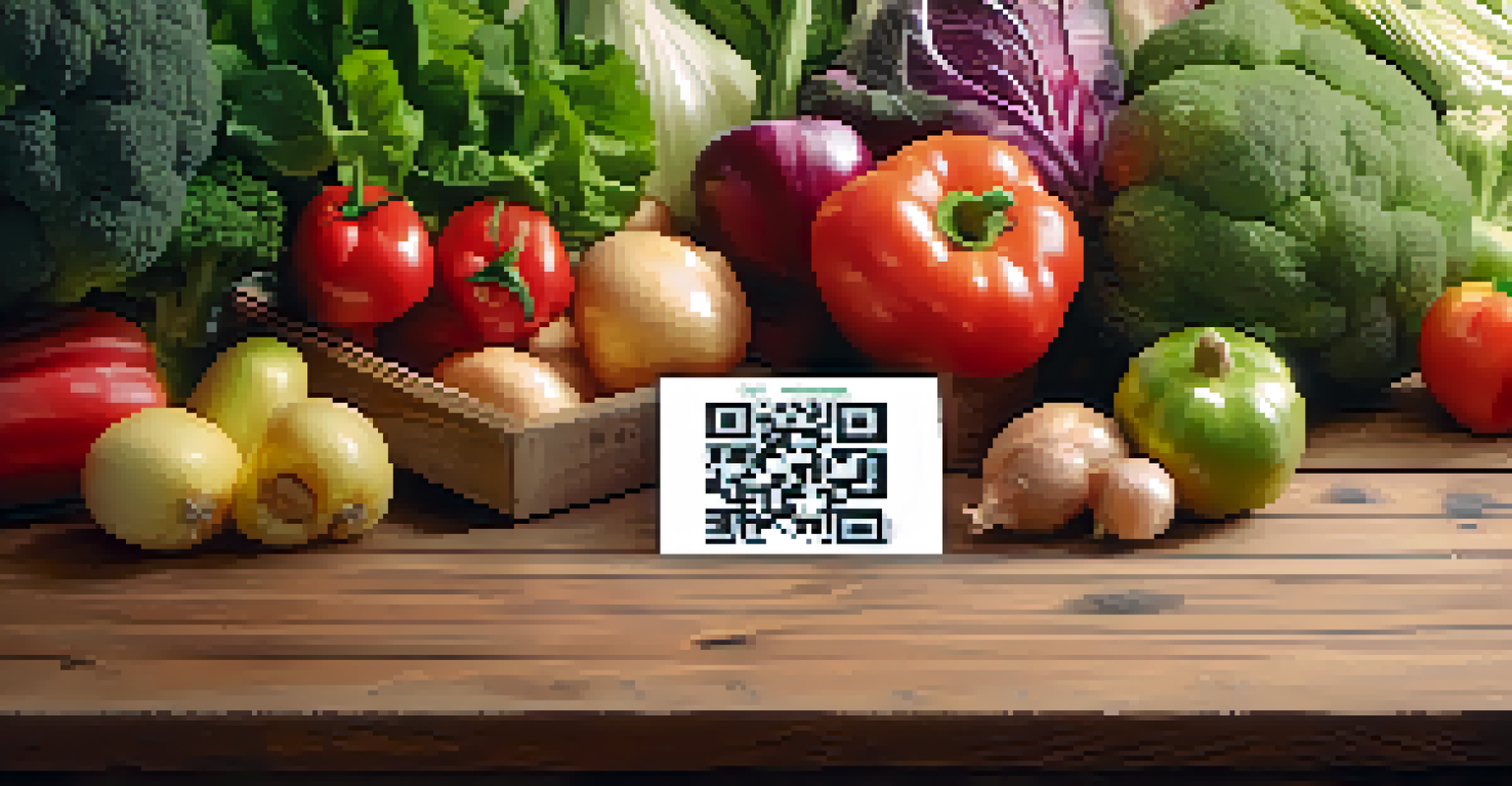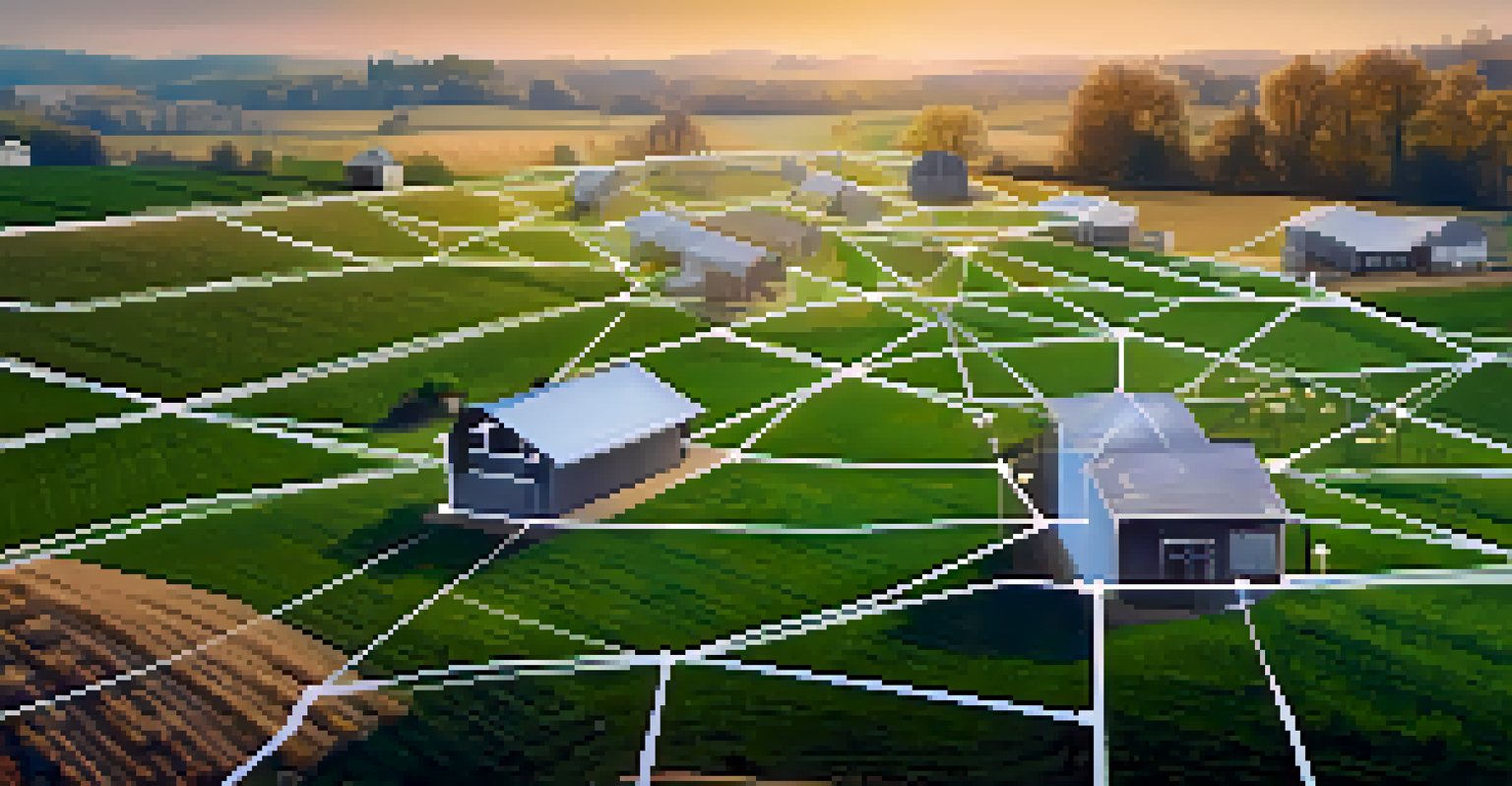Leveraging Ethereum for Agricultural Supply Chain Solutions

Understanding Ethereum and Its Role in Agriculture
Ethereum is a decentralized blockchain platform that enables smart contracts, which are self-executing contracts with the terms directly written into code. This technology can revolutionize the agricultural sector by enhancing transparency and efficiency. Farmers and suppliers can use Ethereum to track the entire lifecycle of agricultural products, from seed to market, ensuring accountability at every step.
Blockchain technology has the potential to revolutionize the agricultural industry by improving efficiency and transparency in the supply chain.
Imagine a farmer who can instantly verify the origin of seeds or fertilizers through a blockchain record. This not only builds trust among consumers but also allows for quick resolution of disputes related to product quality. By harnessing Ethereum's capabilities, the agricultural supply chain can become far more resilient and trustworthy.
Moreover, Ethereum's smart contracts can automate many processes, reducing paperwork and administrative burdens. This means farmers can spend more time focusing on cultivation rather than logistics, ultimately leading to increased productivity.
Enhancing Traceability in Food Production
Traceability is crucial in the agricultural supply chain, especially when it comes to food safety. With Ethereum, every transaction and movement of goods can be recorded on the blockchain, providing an immutable record that anyone can access. This level of transparency is invaluable in ensuring that consumers can trace their food back to its source.

For example, if a foodborne illness outbreak occurs, authorities can quickly identify the source of contamination through the blockchain. This not only protects public health but also minimizes losses for farmers and suppliers by enabling swift action. By leveraging Ethereum, the entire ecosystem benefits from enhanced safety protocols.
Boosting Transparency in Agriculture
Ethereum enhances transparency in the agricultural supply chain, allowing farmers and consumers to trace products from origin to market.
Additionally, consumers today are increasingly concerned about the origin of their food. Ethereum allows consumers to scan a product's QR code to see its entire journey, creating a stronger connection between them and their food. This kind of transparency can boost consumer confidence and loyalty.
Reducing Fraud and Ensuring Fair Pricing
Fraud is a significant issue in agricultural supply chains, leading to unfair pricing and loss of trust among stakeholders. Ethereum's transparent ledger helps mitigate this risk by providing a verifiable history of transactions that can't be modified or deleted. This means that all participants can have confidence in the pricing and quality of products.
Empowering farmers with access to real-time data is crucial for sustainable agricultural practices and informed decision-making.
For instance, when a farmer sells their produce, the transaction details can be recorded on Ethereum, ensuring that all parties agree on the price and quality beforehand. This reduces the chances of disputes after the fact, fostering a fairer trading environment.
Moreover, smart contracts can automate payment processes, ensuring that farmers receive their payments promptly upon delivery. This not only improves cash flow for farmers but also encourages them to maintain high-quality standards, knowing they will be compensated fairly.
Streamlining Operations with Smart Contracts
Smart contracts are a game-changer for streamlining operations in the agricultural supply chain. These contracts automatically execute actions based on predefined conditions, reducing the need for intermediaries. For example, a smart contract could automatically release payment to a farmer once their goods are delivered to a warehouse.
This automation not only speeds up transactions but also reduces the potential for human error, making the entire process more efficient. Imagine a scenario where every stakeholder in the supply chain—from farmers to distributors—can trust that agreements will be honored without the need for constant oversight.
Streamlining Processes with Smart Contracts
Smart contracts on Ethereum automate transactions, reducing paperwork and improving efficiency for farmers and suppliers.
Furthermore, smart contracts can also facilitate better planning and forecasting. By analyzing data from previous contracts and transactions, farmers and suppliers can make more informed decisions, ultimately leading to optimized resource allocation and reduced waste.
Empowering Farmers with Data Access
One of the most significant advantages of using Ethereum in agriculture is the empowerment of farmers through data access. Traditionally, farmers have limited access to market data, which can affect their decision-making. With blockchain technology, they can gain real-time insights into market trends, pricing, and consumer preferences.
For example, a farmer can access information about the demand for certain crops in different regions. This allows them to make informed choices about what to plant, increasing their chances of success. By leveraging Ethereum, farmers can become more proactive rather than reactive, enhancing their profitability.
Additionally, this data access can foster collaboration among farmers. They can share insights and best practices directly through the blockchain, promoting a community-driven approach to agriculture that benefits everyone involved.
Building Trust with Consumers Through Transparency
In today's market, consumers are increasingly seeking transparency about the products they purchase. By leveraging Ethereum, farmers can provide detailed information about their farming practices, certifications, and product origins directly to consumers. This transparency helps build trust and strengthens customer relationships.
Imagine a consumer who can see not only where their food comes from but also how it was produced. This kind of authenticity resonates with many shoppers, particularly those who prioritize sustainability and ethical practices. By using Ethereum, farmers can showcase their commitment to high standards and responsible farming.
Empowering Farmers with Data Insights
Blockchain technology provides farmers with real-time market data, enabling informed decision-making and increased profitability.
Moreover, this trust can translate into customer loyalty. When consumers feel connected to the source of their food, they are more likely to support those farmers in the long run, leading to sustainable business growth.
Future Outlook: The Potential of Ethereum in Agriculture
As we look to the future, the potential of Ethereum in the agricultural sector is immense. With continuous advancements in blockchain technology, we can expect even more innovative solutions that address longstanding challenges in the supply chain. This could include enhanced data analytics, better integration with IoT devices, and more robust security measures.
Imagine a world where every aspect of food production and distribution is monitored and optimized through blockchain. Such advancements could lead to unprecedented efficiencies and sustainability, making agriculture more resilient to challenges like climate change and market fluctuations.

In conclusion, leveraging Ethereum for agricultural supply chain solutions not only improves efficiency but also fosters trust, accountability, and sustainability. As more farmers and stakeholders adopt this technology, we can look forward to a more transparent and robust agricultural ecosystem.